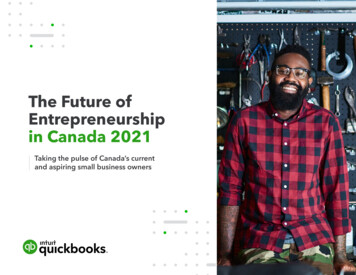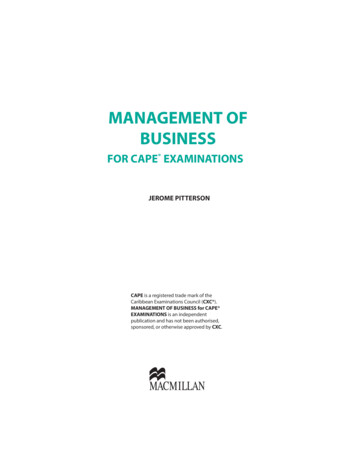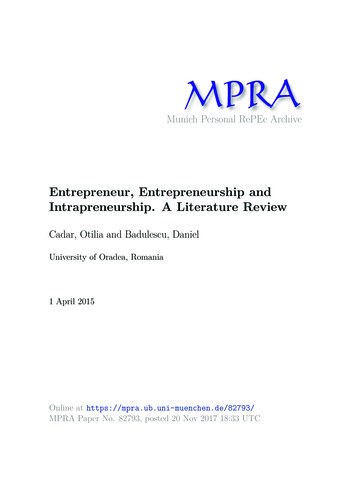
Transcription
The Future ofEntrepreneurshipin Canada 2021Taking the pulse of Canada’s currentand aspiring small business owners1
What’s insideAbout the survey What the state of entrepreneurshiplooks like in CanadaThe study, conducted leveraging the AngusReid panel on behalf of Intuit QuickBooksCanada, was completed by 2,006 Canadians,nationally representative of the Canadianpopulation. Among the total sample, 589Canadians identified as entrepreneurs,defined as having undertaken one or moreentrepreneurship initiatives (i.e., starting abusiness, whether formally incorporatedor not, as a primary means of income orsupplementary means of income, and asstarted alone or with others), and 247 identifiedas aspiring entrepreneurs, defined as notyet having undertaken an entrepreneurshipinitiative, but considering it in the next 2 years.The estimated margin of error for the totalsample is /- 3% at a 95% confidence level. Thestudy took place online from April 14 -19, 2021. The impact of COVID-19 on smallbusiness owners Motivations and barriers toentrepreneurship How entrepreneurs are embracinge-commerce and digital tools What opportunities entrepreneurs seeto better support their success2
The future of entrepreneurship in Canada is brightSmall businesses are the backbone of the Canadian economy, whichmeans entrepreneurship is an important factor that shapes theeconomic growth of the country. Powering prosperity for Canadiansmall businesses is at the heart of what we do at Intuit QuickBooks,and although COVID-19 has undoubtedly disrupted the lives ofCanadians, with disruption often comes opportunity.To better understand how Canadians are adapting to this new world,we wanted to get a sense of the state of entrepreneurship in Canadaas we look towards economic recovery.It’s exciting to see that the entrepreneurial spirit in Canada is aliveand well. As our survey reveals, entrepreneurship has continued togrow since the beginning of COVID-19, both because of and in spiteof the challenges it presented. Among Canadian entrepreneurs, onein five (21%) started their business within the past year. To put that inperspective, that represents close to two million Canadians – morethan the population of Calgary.Of course, we can’t ignore the challenges that remain. While money isa major motivator for entrepreneurs, it’s also a point of concern,especially among Gen Zs and Millennials. Beyond financialchallenges, being an entrepreneur is stressful. It can de-prioritizework-life balance and be mentally and emotionally draining.From funding and financial management resources to better supportfor mental health, entrepreneurs need our support. There’s a clearopportunity for the private sector, government and even non-profitsto partner with Canada’s entrepreneurs and drive our economicrecovery forward, together.David MarquisVP & Country Manager of Intuit CanadaMany of these entrepreneurs are embracing digital, from sellingonline to using digital marketing tools to take their businesses to thenext level. You have probably witnessed firsthand as neighbourhoodbusinesses have pivoted to survive, from restaurants pivoting to mealkit delivery to small brick-and-mortar retailers diving intoe-commerce.As you’ll see in this report, Canadian entrepreneurs are optimisticabout the future and at QuickBooks, we are too. Not only is runningone’s own business personally rewarding, but a culture of growingentrepreneurship has a positive impact on our economy and society.3
The state of entrepreneurshipin CanadaCanada has an entrepreneurial spirit. In fact, 98% of businesses in Canada aresmall businesses. Our survey reveals that a third of Canadians are currentlyentrepreneurs or have undertaken an entrepreneurial endeavor in theirlifetime. COVID-19 sparked even more entrepreneurship in Canada, with newbusinesses emerging in the wake of an extraordinary disruption.1 in 5Canadian entrepreneurs startedtheir business within the past year.That’s close towithentrepreneurs in Canada,starting their business during COVID-19.9 million 2 millionCOVID-19 created both challenges and opportunities for entrepreneurshipin Canada. Stay-at-home orders and rolling closures affected many smallbusinesses and created financial pressures. At the same time, a boost inspare time and the need to find new sources of income also prompted someCanadians to start their own businesses on the side or full time.4
Why businesses started upin the last year39%23%15%had more spare timedue to COVID-19.faced financial pressuresfrom COVID-19 (19% frombeing laid off).Gender, generation, and geography all play a role in Canada’sentrepreneurial makeup. Men have been more likely than womento have taken on starting a new business in their lifetime.34%VSof Canadian men havetaken on an entrepreneurialendeavor25%of Canadianwomen have taken on anentrepreneurial endeavorWho started up?saw an unmet needin the market.It’s not a surprise that older Canadians – Gen Xers and BabyBoomers – are more likely to have been entrepreneurs in theirlifetime. However, Gen Zs and Millennials are more likely tohave started their business within the past year.Many of Canada’s entrepreneurs, especially those who started upin the past year, consider their endeavors to be side businesses.Canadian entrepreneurs considertheir entrepreneurship initiative tobe a side business.72%who started in the lastyear say theirs is a sidebusiness.44% Gen Zand Millennials25%Gen X7% BabyBoomers5
“Before COVID-19 hit, our game storeoperated as brick and mortar only.Flash forward to today, we’ve jumpedfeet first into digital and our onlinestore has redefined our businessmodel and how we approach selling.“– ANDREA ROBERTSON, Rain City Games6
The future ofentrepreneurshipis digitalHelping businessesget onlineCurrent and aspiring entrepreneurs are putting more effort into e-commerce.Along with brick-and-mortar businesses pivoting to selling their productsonline, we’re also seeing more entrepreneurs emerge as online sellers.The shift to selling online is moreOverall, Canadian entrepreneurs are more oriented towards selling servicesover products, and lean towards consumers as their customers, rather thanother businesses, though some do sell to both.get small businesses online through72%of entrepreneurssell services and43% sell products.79%sell to consumers,while 44% sell toother businesses.important than ever before. We joinedforces with Digital Main Street to helpthe development of e-commercestorefronts and we are committed tofinding new and innovative ways tosupport the growth and prosperity ofsmall businesses.Learn moreWhile 41% of Canadian entrepreneurs sell exclusively offline, more sellonline, and 22% sell through both channels. Among the businesses startedup over the past year, 3 in 4 sell online, and over half sell exclusively online.59%of entrepreneurssell online.37%sell online only.7
Aspiring entrepreneurs are also more likely to focus their attention online.4 in 5aspiring entrepreneurs plan to selltheir products or services online.Female entrepreneurs are the most likely to sell exclusively online, whileyounger generations are also most likely to sell online.Who’s selling online only?FemaleGen. Z/MillenialMaleGeneration XBaby Boomers42% female entrepreneursonline vs. 34% of males.49% of Gen Z and Millennialentrepreneurs vs. 38% of Gen Xand 31% of Baby Boomers.Along with selling online, entrepreneurs are also generally comfortableusing digital tools to manage and build their businesses.What digital tools are entrepreneurscomfortable using?67%say digitalmarketing64%say digitalbanking tools62%say digital communication solutions8
However, entrepreneurs are generally less comfortable when it comesto financial management software.41%feel comfortable usingfinancial managementsoftware.An opportunityfor easier financialmanagementWhile Canadian entrepreneurs are provingto be savvy with digital marketing andcommunications, they have an opportunityto modernize how they use digital tools for31%financial management. Many entrepreneursof aspiring entrepreneurs arecomfortable using financialmanagement software.are leaning on desktop tools and offlineprocesses, instead of cloud-based services,which are often more streamlined, savingtime and money.Only a third report using an accounting service or professional. With thedesire to handle finances independently, but a gap in comfort, there’san opportunity for entrepreneurs to build their knowledge of digitalfinancial management tools.1/3of entrepreneurs reportusing an accountingservice or a professional.At QuickBooks, we use our AI-poweredplatform and deep customer insight to buildproduct innovations that empower our smallbusiness owners. Ultimately, our vision is forQuickBooks to be the source of truth for yourbusiness. A single integrated platform toaddress your needs.Learn more9
“Being a restaurant owner has been anuphill battle over the past year. Becauseof COVID-19, we’ve had to find new waysto pivot and get in front of our customers– through food delivery and social mediamarketing. Now, the community I’vecreated through channels like Instagramare my support system.”– JENNIFER FOSTER,CW Coops Angus10
COVID-19’s impacton entrepreneursWhile COVID-19 has prompted new businesses to emerge, it undoubtedlyhad an impact on existing business owners – although in some cases, it ledto positive growth. Half of entrepreneurs over 55 reported that COVID-19did not affect their business, compared to just a third of Gen Z andMillennials and 36% of Gen X entrepreneurs.50%of entrepreneursover 55 reported thatCOVID-19 did notaffect their business.1/3of Gen Z andMillenials reportedthat COVID-19 did notaffect their business.36%Gen X entrepreneursreported thatCOVID-19 did notaffect their business.3 in 5entrepreneurs say that COVID-19 hasaffected their business in some way.11
How COVID-19 affected businesses25%paused or closedtheir business.18%scaled backtheir business.16%grew theirbusiness.13%pivoted theirbusiness.As a result of COVID-19, business owners have had to adjustfinancially and in their personal lives.61%How all entrepreneurs* are making sacrifices1 in 4have been workinglonger hours.1 in 5have taken onmore debt.Despite the challenges,COVID-19 has also influencedhow entrepreneurs arethinking about work.1 in 5have foregone apersonal salary.55% of entrepreneurshave begun rethinkingtheir careers.How entrepreneurs are rethinking workof entrepreneurssay they have hadto make sacrifices.64% have a greaterdesire for multipleincome streams.59% want morework-life balance.56% want morejob security.Among entrepreneurs over 55, 16% have even delayedretirement. However, younger entrepreneurs are more likelygenerally to have made sacrifices like working longer hours,spending less time with family and taking on debt.55% want topositively contributeto society.53% are motivatedto find new ways togrow their business.53% have a greaterdesire to work forthemselves.*These stats include entrepreneurs overall, not Gen Z or Millenials specifically.12
“This past year has been a challenge.Running a company, being a mom andbeing a teacher to my two girls leaves noroom for work-life balance. But, everythingI do is for them – they are my motivation.”– KIM WEST, Kids Swag Co13
What’s drivingentrepreneurs now?While money is the number one driving force for entrepreneurship,freedom and flexibility also push entrepreneurs.What’s motivating entrepreneurs?68%56%58%50%say earningmoneysay being theirown bosssay setting theirown hourssay doing something meaningfulMoney is also the top motivator across generations, but youngerentrepreneurs are more likely to seek out creative freedom and thechance to have a positive impact on the world around them.14
What differentgenerations wantFemale entrepreneurs seekdifferent benefitsSetting their own hoursMoney62%Creative freedomMaking a differenceFemale50%MaleGen Z and Millennial75%61%Doing something meaningful58%52%FemaleGeneration X43%Male74%49%Creative freedom36%Baby Boomers60%39%54%Female40%Male34%Taking a vacation whenever they wantFemale entrepreneurs are also more likely than their malecounterparts to crave freedom, meaning and flexibility. Some ofthat sentiment may be driven by women often being the primarycaregivers in their households and as a result, wanting greaterflexibility in how they use their time.32%Female23%Male15
“My employees are my biggest asset.Being deemed essential, we need to bein the workplace, so my ultimate goalis keeping us all safe and sane, and ourmental health is a top priority.”- KAREN LAI, KPM Power16
The role of money& mental healthCOVID-19supportWhile definitely a motivator behind entrepreneurship across generations,money is also a key area of concern among small business owners.At QuickBooks, we’re always supportingthe entrepreneurs that keep oureconomy running — and when COVID-1946%hit, QuickBooks put all hands on deck toof entrepreneurs reportworrying about finances.say cash flow22%say accessto capitalGoFundMe to support small businessesall around the world.Financial issues worryingentrepreneurs37%help harness millions of dollars throughRead more16%say managingbusiness financesBeyond financial challenges alone, 1 in 2 entrepreneurs are also worriedabout failing and are concerned with both wider business challengesbeyond finances and their work-life balance.17
Canadianentrepreneurs needsupport to succeedWhat’s keepingentrepreneurs up at night?QuickBooks’ Ask the Expert segmentsshare tangible advice from experts and39%say COVID-19’s impact on the economy35%say growing theircustomer base28%say succeeding in acompetitive marketthought leaders on topics important tosmall business owners and entrepreneurs.From navigating mental burnout tobuilding a social media strategy, this seriesaims to arm small businesses with theknowledge they need to thrive. SegmentsClose to1 in 4also say time management and working longhours are a concern.are hosted monthly on our social channelson Facebook and Instagram.Learn moreUncertainty around finances and failure are also having an impact onan entrepreneur's mental health. Overall, the majority of entrepreneurs(76%) say running their own business is stressful and 1 in 2 also say thereare not enough mental health resources for entrepreneurs.18
What’s affecting mental health?3 in 51 in 2don’t have the financialresources to competewith other businesses.1 in 2are worriedabout failure.Financial uncertaintyare worriedabout money.1 in 2are worriedabout burnout.Compared to older entrepreneurs, Gen X entrepreneurs are alsomost likely to report feeling stress, worry – including about finances –and burnout.Financial uncertainty may also have implications for futureentrepreneurship in Canada. Among aspiring entrepreneurs,even more are concerned about their finances.3 in 4aspiring entrepreneursare worried about money.Gen X is stressed81%of Gen Xers findentrepreneurshipstressful.63%are worriedabout failure.68%are worriedabout money.63%2 in 3worry they won’t havethe financial resourcesto compete.are worriedabout burnout.19
“With growing recognition of physicaland mental health issues in our society,and the implications COVID-19 has hadon entrepreneurs and their employees,government policies aimed at helpingsmall business should prioritize physicaland mental wellness for business ownersand their teams.”– KRISTI HEROLD, CEO, JAM - powered by Sport & Social Group20
What entrepreneursneed for the futureDespite the challenges arising out of COVID-19, established and aspiringCanadian entrepreneurs alike are optimistic about the future.73%of entrepreneursare optimistic forthe future.76%of aspiring entrepreneurs are optimisticfor the future.At the same time, they need support to succeed in a post-COVID world.2 in 5entrepreneurs feel moregovernment fundingwould be helpful2 in 5say the same abouteasier access tofundingEntrepreneurshelpingentrepreneursThrough the Intuit Prosperity Accelerator,we worked with tech startups to solvechallenges consumers and smallbusinesses are facing as a result ofCOVID-19.Learn more1 in 2aspiring entrepreneursalso think more governmentfunding would help.21
Along with financial support, entrepreneurs also think access to freeinformational training would help them succeed post COVID-19. Youngergenerations – Gen Z and Millennial entrepreneurs – and women are mostlikely to see value in these kinds of resources.Resources or courses entrepreneurs want34%marketing33%taxes31% 26%accountingmental healthmanagement25%buildingcapitalSoon-to-be business owners want similar educational resources as their moreestablished counterparts but are also more likely to think other programsconnecting them to experienced business owners would be helpful.What aspiring entrepreneurs want44%say mentorshipprograms35%say networking opportunitieswith other entrepreneurs28%say informational webinarswith other entrepreneurs22
How Canada cansupport the futureof entrepreneurshipCanada’s entrepreneurs and emerging business ownersare optimistic – a good sign for the country’s postCOVID-19 recovery and the year to follow. While moneyis still the primary motivational driver for entrepreneurs,the potential for creative freedom and flexibility isinspiring people across the country to be their own boss.However, these economic engines need support. ForCanada to ensure current business owners are thrivingand we have a healthy pipeline of emerging businessowners, supporting entrepreneurs now is essential.23
What small businessare looking forGreater financial supportfor entrepreneursClearly, money is a motivating factor forentrepreneurs, but it’s also a source ofconcern. Young and aspiring entrepreneursespecially – Canada’s future small businessowners – are concerned about debt levels,access to capital and having the resources tocompete. Governments and the private sectoralike can step up to help these businessessecure financing and embrace better financialmanagement tools to maximize their success.Post-COVID-19 recovery resourcesTools and resources to help support smallbusiness recovery: Small Business Help: Find the helpyou need to prepare your business,communicate with customers, and supportyour employees during COVID-19.Canadian Federation of IndependentBusiness: CFIB offers resources andsupport to help small businesses grow andnavigate COVID-19 crisis. Government of Canada: COVID-19benefits and services to help Canadiansand businesses facing hardship as a resultof the global COVID-19 outbreak.More mental health resourcesand programs to supportwork-life balanceStronger educationalresources and networkingopportunitiesBeing an entrepreneur is rewarding but alsostressful. Female entrepreneurs and GenXers in particular are the most likely to befeeling the pressure of COVID-19, which hasaffected their work-life balance. However,the majority of entrepreneurs surveyedsay running their own business is stressful.Programs that support mental health andwell-being may help more entrepreneurs tothrive. Embracing digital tools to help savetime and money when managing the dayto-day can also have a positive impact.From tax training to insights on marketing,entrepreneurs are after resources to help them notonly manage their business day-to-day but grow.Aspiring entrepreneurs especially are also lookingfor more networking and mentorship opportunities,which can potentially play a key role in their futuresuccess – and as a result, the success of Canada’ssmall business community. The private sector andnon-profits especially can play an important role inproviding these resources and opportunities.Mental health resourcesResources offering a range of services andsupport on mental health and well-being: CAMH resources Business Link resources Business DevelopmentBank of Canada resourcesResources for running your businessQuickBooks is committed to providing resourcesfor Canada’s growing businesses. Here is some ofwhat we offer: Free Resources for Running Your Business: Video Tutorials on QuickBooks Online: Business Builder Webinars: Learn howFind free resources and expert opinions on thefinancial management topics most relevant toyou, as a small business owner.Watch step-by-step videos to learn your wayaround QuickBooks.to improve the way you do business fromindustry experts.24
25
Reid panel on behalf of Intuit QuickBooks Canada, was completed by 2,006 Canadians, nationally representative of the Canadian population. Among the total sample, 589 Canadians identified as entrepreneurs, defined as having undertaken one or more entrepreneurship initiatives










